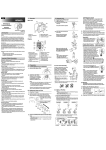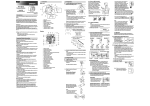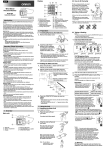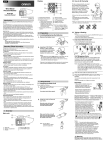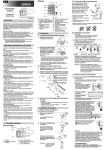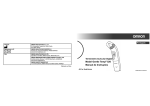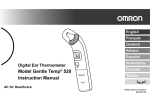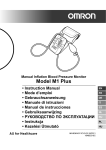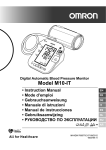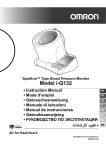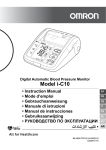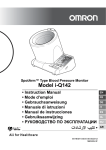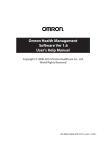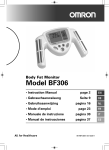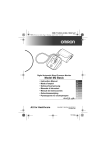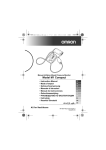Download Omron R2 User's Manual
Transcript
Wrist Blood Pressure Monitor Model R2 • Instruction Manual • Mode d’emploi • Gebrauchsanweisung • Manuale di istruzioni • Manual de instrucciones • Gebruiksaanwijzing • EN FR DE IT ES NL RU AR IM-HEM-6113-E(V)-02-10/2011 5330293-3B Contents Introduction ..................................................... 3 Important Safety Information ......................... 4 1. Overview ..................................................... 6 2. Preparation ................................................. 9 2.1 Installing/Replacing the Batteries ............ 9 3. Using the Unit ........................................... 11 3.1 Applying the Wrist Cuff .......................... 11 3.2 Correct Posture ..................................... 13 3.3 Taking a Reading .................................. 14 3.4 Using the Memory Function .................. 16 4. Quick Reference Guide ............................ 18 5. Handling Errors and Problems ............... 19 5.1 Error Messages ..................................... 19 5.2 Troubleshooting .................................... 20 6. Maintenance and Storage ........................ 22 7. Technical Data .......................................... 24 8. Some Useful Information about Blood Pressure .................................................... 27 2 Introduction Thank you for purchasing the OMRON R2 Wrist Blood Pressure Monitor. This remarkable, compact and easy to use instrument is ideal for people who frequently monitor their own blood pressure. The small, pre-formed wrist cuff is very convenient and easy to apply. With a push of a button the OMRON Wrist Blood Pressure Monitor measures your blood pressure and pulse and displays the reading on a clear digital panel. Perfect for quick, easy readings at home, at work, and while travelling. It also stores up to 30 sets of measurement results in memory. The OMRON Wrist Blood Pressure Monitor uses the oscillometric method of blood pressure measurement. This means the unit detects the pulse wave vibrations in the artery of your wrist and converts the oscillations into a digital reading. For comfortable controlled inflation without the need of pressure pre-setting or re-inflation the device uses its advanced “IntelliSense” technology. Clinical research has proven a direct relationship between blood pressure in the wrist and blood pressure in the arm. Changes in wrist blood pressure reflect changes in arm blood pressure because the arteries in the wrist and the arm are connected. Frequently measuring the blood pressure in your wrist will provide you and your doctor with an accurate indication of changes in your true blood pressure. Intended Use This product is designed to measure the blood pressure and pulse rate of people within the range of the designated wrist cuff, following the instructions in this instruction manual. It is mainly designed for general household use. Please read the Important Safety Information in this instruction manual before using the unit. Please read this instruction manual thoroughly before using the unit. For specific information about your own blood pressure, CONSULT YOUR DOCTOR. 3 EN Important Safety Information Consult your doctor prior to using in pregnancy or if diagnosed with arrhythmia or arteriosclerosis. Please read this section carefully before using the unit. Warning: • Indicates a potentially hazardous situation which, if not avoided, could result in death or serious injury. (General Usage) • Always consult your doctor. Self-diagnosis of measurement results and self-treatment are dangerous. • People with severe blood flow problems, or blood disorders, should consult a doctor before using the unit, as cuff inflation can cause internal bleeding. (Battery Usage) • If battery fluid should get in your eyes, immediately rinse with plenty of clean water. Consult a doctor immediately. Caution: • Indicates a potentially hazardous situation which, if not avoided, may result in minor or moderate injury to the user or patient or damage to the equipment or other property. (General Usage) • Do not leave the unit unattended with infants or persons who cannot express their consent. • Do not use the unit for any purpose other than measuring blood pressure. • Do not disassemble the unit or wrist cuff. • Do not inflate the wrist cuff over 299 mmHg. • Do not use a mobile phone or other devices that emit electromagnetic fields, near the unit. This may result in incorrect operation of the unit. • Do not operate unit in a moving vehicle (car, airplane). 4 Important Safety Information (Battery Usage) • If battery fluid should get on your skin or clothing, immediately rinse with plenty of clean water. • Use only two “AAA” alkaline batteries with this unit. Do not use other types of batteries. • Do not insert the batteries with their polarities incorrectly aligned. • Replace old batteries with new ones immediately. Replace both batteries at the same time. • Remove the batteries if the unit will not be used for three months or more. • Do not use new and used batteries together. General Precautions • Do not apply strong shocks and vibrations to or drop the unit. • Do not take measurements after bathing, drinking alcohol, smoking, exercising or eating. • Do not inflate the wrist cuff when it is not wrapped around your wrist. • Do not wash the wrist cuff or immerse it in water. • Read and follow the “Important information regarding Electro Magnetic Compatibility (EMC)” in the Technical Data Section. • Read and follow the “Correct Disposal of This Product” in the Technical Data Section when disposing of the device and any used accessories or optional parts. 5 EN 1. Overview Main Unit C A D E B A. Display B. Battery compartment cover 6 C. Wrist cuff D. O/I START button E. MEM (Memory) button 1.Overview Display F G J H K L I F. Systolic blood pressure G. Diastolic blood pressure H. Memory symbol (Displayed when viewing values stored in memory) I. Battery low symbol J. Heartbeat symbol 1. Flashes during measurement 2. If flashing after measurement completed or when viewing results stored in the memory, indicates blood pressure out of recommended range* K. Pulse L. Deflation symbol *Note: EN If your systolic or diastolic pressure is outside the standard range (above 135/85 mmHg) the Heartbeat symbol ( ) will blink. Please refer to “3.3 Taking a Reading”. 7 1.Overview Package contents N M M. Two “AAA” alkaline (LR03) batteries • Blood pressure pass • Blood Pressure Monitor unit 8 N. Storage case • Instruction manual • Guarantee card 2. Preparation 2.1 1. Installing/Replacing the Batteries Remove the battery compartment cover by pulling it off in the direction of the arrow. 1) Push the hook on the bottom of the battery cover. 2) Pull the cover off the main unit. 2 1 2. Insert two identical 1.5V “AAA” alkaline (LR03) batteries in the battery compartment. EN Make sure their polarity (+/-) is aligned with the polarity (+/-) as indicated in the battery compartment. 9 2.Preparation 3. Put the battery cover back in place. Note: The measurement values continue to be stored in memory even after the batteries are replaced. Battery Life & Replacement If the battery low symbol ( ) appears on the display, replace both batteries at the same time. - When the battery low symbol ( ) starts to blink, you will still be able to use the unit for a short while. You should replace the batteries with new ones as soon as possible. - When the symbol ( ) remains lit, the batteries are exhausted. You should replace the batteries with new ones at once. • Turn the unit off before replacing the batteries. • Remove the batteries if the unit will not be used for three months or more. • Dispose of batteries according to applicable local regulations. • Two new identical 1.5V “AAA” alkaline batteries will last for approximately 300 measurements, when used to take two measurements a day. • Since the supplied batteries are for monitoring use only, they may have a shorter life and do not last for 300 measurements. 10 3. Using the Unit 3.1 Applying the Wrist Cuff You can take a measurement on either your left or right wrist. Notes: • You can take a measurement on either your left or right arm. The blood pressure can differ between the right arm and the left arm and therefore also the measured blood pressure values can be different. Omron recommends to always use the same arm for measurement. If the values between the two arms differ substantially, please check with your physician which arm to use for your measurement. • To ensure correct measurement, apply the wrist cuff so that it fits comfortably around your wrist. • Do not apply over clothing. 1. Place the wrist cuff over your left wrist with your left thumb facing upward. ulna EN Note: Make sure that the wrist cuff does not cover the protruding part of the wrist bone (ulna) on the outside of the wrist. 11 3.Using the Unit 2. Hold the bottom part of the wrist cuff and wrap it around the wrist while pulling so that it fits comfortably. Notes: • Unless the wrist cuff is wrapped securely around the wrist, it will not be possible to take correct measurements. • If you have a slender wrist, the cuff may feel slightly loose. However, this will not affect measurement results and you should not force the cuff to fit. • The remaining part of the wrist cuff can be conveniently folded back out of the way. • If the remaining part of the cuff is difficult to fold back, measurement results will not be effected. Taking a reading on the right wrist Measurements can also be made on the right wrist. Fit the unit on the right wrist as shown. 12 3.Using the Unit 3.2 Correct Posture Correct posture during measurement helps you get accurate results. You should also try to measure your blood pressure at the same time each day. Notes: • Do not take measurement after bathing, drinking alcohol, or exercising. • Do not move or talk during measurement. Sit comfortably with your back straight, hold your arm across your chest and relax. Position your arm so that the unit is at the same level as your heart. EN Do not use your other hand to support the wrist cuff. This can result in inaccurate measurement results. Relax your wrist and hand. Do not bend Do not clench Do not bend your your wrist back. your fist. wrist forward. 13 3.Using the Unit 3.3 1. Taking a Reading Press the O/I START button to start measurement. The wrist cuff will start to inflate automatically after the power is turned on. 2. After the unit has detected your blood pressure and pulse rate, the cuff automatically deflates and your blood pressure and pulse rate are displayed. Notes: • Sit still and do not talk or move until the measurement is completed. • Keep the unit at heart height until the measurement is completed. • To stop measurement, press the O/I START button at any time during measurement. 14 3.Using the Unit 3. Check the measurement result. The unit automatically stores blood pressure and pulse rate into its memory. Refer to “3.4 Using the Memory Function”. 4. Undo the cuff and remove the unit. 5. Press the O/I START button to turn off the unit. If you forget to turn off the unit, it will shut itself off automatically after two minutes. Important: • If your systolic or diastolic pressure is outside the standard range, the heartbeat symbol will blink when the measurement result is displayed. Recent research suggests that the following values can be used as a guide to high blood pressure for measurements taken at home. Systolic Blood Pressure Above 135 mmHg Diastolic Blood Pressure Above 85 mmHg EN This criteria is for home blood pressure measurement. For professional office blood pressure measurement criteria, please refer to “Classification of Blood Pressure by the World Heath Organization” (refer to “8. Some Useful Information about Blood Pressure”). 15 3.Using the Unit 3.4 Using the Memory Function This unit has a memory capable of storing 30 sets of readings. Every time you complete the measurement, the unit automatically stores blood pressure and pulse rate. Note: When 30 sets of readings are stored in memory, the oldest set will be deleted to store a new set. To View Previous Readings Stored in Memory 1. Press the MEM button to view readings stored in memory from the most recent to the oldest. The Memory number appears for a second before the pulse rate is displayed. The newest set is numbered “1”. Systolic blood pressure Diastolic blood pressure Pulse Press the MEM button repeatedly to cycle through the readings. 2. Press the O/I START button to turn the unit off. Note: If you forget to turn the unit off, it will automatically shut itself off after two minutes. 16 3.Using the Unit To Delete All Values in Memory You cannot delete the stored readings partially, all the readings in the unit will be deleted. To delete stored readings, first press the MEM button. Then while holding it down, press the O/I START button simultaneously for about 2-3 seconds. All readings will then be deleted. Note: After the reading have been deleted, the screen to the right of the illustration above appears and Memory symbol flashes. Release the buttons to return to the memory display. EN 17 4. Quick Reference Guide Use this as a quick reference guide only. If you are using this device for the first time, please read carefully Chapter 3 of this Instruction Manual. Avoid eating, drinking, smoking, or exercising for at least 30 minutes before taking a measurement. You should also try to measure your blood pressure at the same time each day. It is recommended that you check your blood pressure at least twice a day, in the morning before breakfast and in the evening before going to bed. Measurement should be taken in a quiet place and you should be in a relaxed, seated position. 1. Align the wrist cuff with the level of your heart and gently support your left arm with your right hand. Do not place your right hand on the cuff itself. 2. Press the O/I START button. Remain quiet, sit still and do not talk during the measurement. Notes: • Always wait at least 2-3 minutes before taking another blood pressure measurement. You may require more rest time between measurements depending on your individual physiological characteristics. • Only use the R2 to measure your own blood pressure to avoid confusion as the results of measurements are stored in memory. • Always wrap the wrist cuff around your wrist before starting to take a measurement. • Always measure your blood pressure on the same wrist. 18 5. Handling Errors and Problems 5.1 Error Messages Error Symbol Cause Cuff over inflated. Movement during measurement. Correction Repeat measurement. Remain still and do not move during measurement. (Refer to “3.3 Taking a Reading”.) The wrist cuff is not fastened securely. Carefully read and repeat the steps listed under “3.1 Applying the Wrist Cuff”. An E mark with a code/number indicates the device has a hardware failure. Consult your OMRON retail outlet or distributor. The battery power is low. Replace the batteries with two new “AAA” alkaline (LR03) batteries. EN Blinks or appears continuously 19 5.Handling Errors and Problems 5.2 Troubleshooting Symptom Cause Are you holding the wrist cuff at heart level? Measure while in the correct posture. (Refer to “3.2 Correct Posture”.) Is the cuff wrapped snugly around the wrist? Wrap the cuff correctly. (Refer to “3.1 Applying the Wrist Cuff”.) Are your arms and shoulders tense? Relax and try taking the measurement again. (Refer to “3.3 Taking a Reading”.) Movement or talking during measurement. Remain still and do not talk during measurement. (Refer to “3.3 Taking a Reading”.) Air is leaking from the wrist cuff. Consult your OMRON retail outlet or distributor. The wrist cuff is loose. Apply the cuff correctly so that it is securely wrapped around the wrist. (Refer to “3.1 Applying the Wrist Cuff”.) The reading is extremely low (or high). Wrist cuff pressure does not rise. Wrist cuff deflates too soon. 20 Correction 5.Handling Errors and Problems Symptom Cause Correction The blood pressure is different each time. The reading is extremely low (or high). Blood pressure readings constantly vary with time of day and how relaxed you are. Take several deep breaths and try to remain relaxed before taking a measurement. The unit loses power during measurement. The batteries are drained. Replace the batteries with new ones. The batteries are drained. Replace the batteries with new ones. The batteries have been inserted incorrectly. Insert the batteries with the correct (+/-) polarity. Nothing happens when you press the buttons. Other problems. • Press the O/I START button and repeat measurement. • If the problem continues, try replacing the batteries with new ones. If this still does not solve the problem, contact your OMRON retail outlet or distributor. 21 EN 6. Maintenance and Storage To protect your unit from damage, please avoid the following: • Subjecting your unit to extreme temperatures, humidity, or direct sunlight. • Washing the cuff or exposing the cuff or unit to water. • Disassembling the unit. • Subjecting the unit to strong shocks or vibrations. Dropping the Unit. • Cleaning the unit with volatile liquids. • • • • The unit should be cleaned with a soft, dry cloth. Use a soft, moistened cloth and soap to clean the cuff. Keep the unit in its storage case when not in use. Fold the cuff into the storage case. Do not store the unit in the following situations: • If the unit is wet. • Locations exposed to extreme temperatures, humidity, direct sunlight, dust or corrosive vapours. • Locations exposed to vibrations, shocks or where it will be at risk of falling. 22 6.Maintenance and Storage Calibration and Service • The accuracy of this blood pressure monitor has been carefully tested and is designed for a long service life. • It is generally recommended to have the unit inspected every two years to ensure correct functioning and accuracy. Please consult your authorised OMRON dealer or the OMRON Customer Service at the address given on the packaging or attached literature. • If the wrist cuff needs to be replaced have this done by an authorised expert. Consult your authorised OMRON dealer or the OMRON Customer Service. • Do not carry out any repairs by yourself. If a defect occurs or you have doubts about the correct functioning of the device, consult your authorised OMRON dealer or the OMRON Customer Service. EN 23 7. Technical Data Product Description Model Display Measurement Measurement Range Memory Accuracy Inflation Deflation Power Source Battery Life Wrist Blood Pressure Monitor OMRON R2 (HEM-6113-E(V) / HEM-6113-E8(V)) LCD Digital Display Oscillometric method Pressure: 0 to 299 mmHg Pulse: 40 to 180 beats/min 30 Measurements Pressure: Within ±3 mmHg Pulse rate: Within ±5% of reading Automatic inflation by pump Automatic rapid deflation Two 1.5V “AAA” alkaline (LR03) batteries Approximately 300 measurements when used twice daily with alkaline batteries at a room temperature of 23°C Operating Temperature/ 10°C to 40°C, 30 to 85% RH Humidity Storage Temperature/ -20°C to 60°C, 10 to 95% RH Humidity Weight of Main Unit Approximately 117 g (not including batteries) 71 mm (w) x 41 mm (h) x 70 mm (d) (not Outer Dimensions including the wrist cuff) Measurable Approximately 13.5 to 21.5 cm circumference of wrist Cuff material Nylon Main unit, storage case, two “AAA” alkaline Package Content (LR03) batteries, instruction manual, guarantee card, blood pressure pass Note: Subject to technical modification without prior notice. 24 7.Technical Data • This OMRON product is produced under the strict quality system of OMRON HEALTHCARE Co. Ltd., Japan. The Core component for OMRON blood pressure monitors, which is the Pressure Sensor, is produced in Japan. • Disposal of this product and used batteries should be carried out in accordance with the national regulations for the disposal of electronic products. = Type B This device fulfils the provisions of EC directive 93/42/EEC (Medical Device Directive). This blood pressure monitor is designed according to the European Standard EN1060, Non-invasive sphygmomanometers Part 1: General Requirements and Part 3: Supplementary requirements for electromechanical blood pressure measuring systems. Caution: Please read the instruction manual carefully before using the device. EN 25 7.Technical Data Important information regarding Electro Magnetic Compatibility (EMC) With the increased number of electronic devices such as PC’s and mobile (cellular) telephones, medical devices in use may be susceptible to electromagnetic interference from other devices. Electromagnetic interference may result in incorrect operation of the medical device and create a potentially unsafe situation. Medical devices should also not interfere with other devices. In order to regulate the requirements for EMC (Electro Magnetic Compatibility) with the aim to prevent unsafe product situations, the EN60601-1-2:2007 standard has been implemented. This standard defines the levels of immunity to electromagnetic interferences as well as maximum levels of electromagnetic emissions for medical devices. This medical device manufactured by OMRON HEALTHCARE conforms to this EN60601-1-2:2007 standard for both immunity and emissions. Nevertheless, special precautions need to be observed: Do not use mobile (cellular) telephones and other devices, which generate strong electrical or electromagnetic fields, near the medical device. This may result in incorrect operation of the unit and create a potentially unsafe situation. Recommendation is to keep a minimum distance of 7 m. Verify correct operation of the device in case the distance is shorter. Further documentation in accordance with EN60601-1-2:2007 is available at OMRON HEALTHCARE EUROPE at the address mentioned in this instruction manual. Documentation is also available at www.omron-healthcare.com. Correct Disposal of This Product (Waste Electrical & Electronic Equipment) This marking shown on the product or its literature, indicates that it should not be disposed of, with other household wastes at the end of its working life. To prevent possible harm to the environment or human health from uncontrolled waste disposal, please separate this from other types of wastes and recycle it responsibly to promote the sustainable reuse of material resources. Household users should contact either the retailer where they purchased this product, or their local government office, for details of where and how they can take this item for environmentally safe recycling. Business users should contact their supplier and check the terms and conditions of the purchase contract. This product should not be mixed with other commercial wastes for disposal. This product does not contain any hazardous substances. 26 8. Some Useful Information about Blood Pressure What is Blood Pressure? Blood pressure is a measure of the force of blood flowing against the walls of the arteries. Arterial blood pressure is constantly changing during the course of the heart’s cycle. The highest pressure in the cycle is called the Systolic Blood Pressure; the lowest is the Diastolic Blood Pressure. Both pressure readings, the Systolic and Diastolic, are necessary to enable a doctor to evaluate the status of a patient’s blood pressure. Why is it a Good Thing to measure Blood Pressure at Home? Having your blood pressure measured by a doctor can cause anxiety which is itself a cause of high blood pressure. As a variety of conditions affect blood pressure, a single measurement may not be sufficient for an accurate diagnosis. Many factors such as physical activity, anxiety, or the time of day, can influence your blood pressure. Thus it is best to try and measure your blood pressure at the same time each day, to get an accurate indication of any changes in blood pressure. Blood pressure is typically low in the morning and increases from afternoon to evening. It is lower in the summer and higher in the winter. Blood pressure is measured in millimetres of mercury (mmHg) and measurements are written with the systolic pressure before the diastolic e.g. A blood pressure written as 135/85, is referred to as 135 over 85 mmHg. 27 EN 8.Some Useful Information about Blood Pressure Upper curve: systolic blood pressure Lower curve: diastolic blood pressure mmHg 200 150 100 50 6 12 18 24 Time of day Example: fluctuation within a day (male, 35 years old) Classification of Blood Pressure by the World Heath Organization The World Health Organization (WHO) and the International Society of Hypertension (ISH) developed the Blood Pressure Classification shown in this figure. Systolic blood pressure (mmHg) Severe hypertension 180 160 Moderate hypertension Mild hypertension 140 Normal systolic value Normal blood pressure 120 Optimal blood pressure (target value) 80 85 130 90 100 110 Diastolic blood pressure (mmHg) This classification is based on the blood pressure values measured on people in a sitting position in outpatient departments of hospitals. * There is no universally accepted definition of hypotension. However, those having the systolic pressure below 100 mmHg are assumed as hypotensive. 28 Manufacturer OMRON HEALTHCARE Co., Ltd. 53, Kunotsubo, Terado-cho, Muko, Kyoto, 617-0002 JAPAN EU-representative OMRON HEALTHCARE EUROPE B.V. Scorpius 33, 2132 LR Hoofddorp THE NETHERLANDS www.omron-healthcare.com Production facility OMRON HEALTHCARE MANUFACTURING VIETNAM CO., LTD. Binh Duong Province, VIETNAM OMRON HEALTHCARE UK LTD. Opal Drive, Fox Milne, Milton Keynes, MK15 0DG U.K. Subsidiary OMRON MEDIZINTECHNIK HANDELSGESELLSCHAFT mbH John-Deere-Str. 81a, 68163 Mannheim GERMANY www.omron-medizintechnik.de EN OMRON SANTÉ FRANCE SAS 14, rue de Lisbonne, 93561 Rosny-sous-Bois Cedex, FRANCE Made in Vietnam 29 Notes 30






























